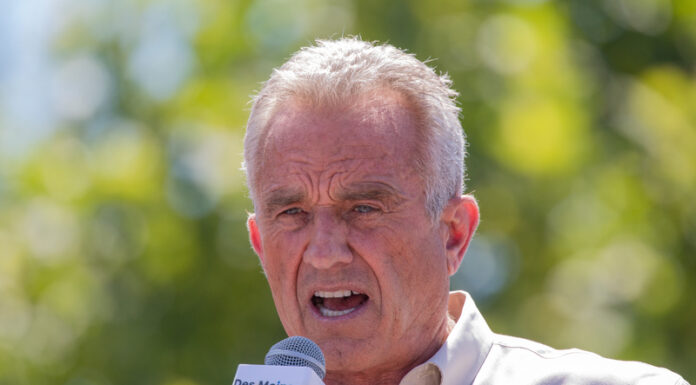The U.S. Department of Health and Human Services has initiated what Secretary Robert F. Kennedy Jr. calls a “massive testing and research effort” involving hundreds of scientists worldwide to uncover the causes behind increasing autism rates. The findings are expected by September.
Kennedy made the announcement during a Cabinet meeting with President Donald Trump on Thursday, April 10, 2025. He indicated that his agency’s ambitious initiative is set to deliver conclusive answers regarding autism’s causes within a few months.
President Trump responded positively, suggesting, “There will be no bigger news conference than that” and adding, “There’s got to be something artificial out there that’s doing this.”
According to the U.S. Centers for Disease Control and Prevention, autism rates have significantly increased over the past twenty years, with about one in 36 children diagnosed with autism spectrum disorder in 2020, compared to one in 150 in 2000. During the Cabinet meeting, Kennedy indicated that newer statistics might reveal the rates rising to approximately one in 31 children.
In discussing potential causes with Kennedy, the president speculated, “If you can come up with that answer, where you stop taking something, you stop eating something, or maybe it’s a shot. But something’s causing it.”
Researchers studying autism attribute the rising rates to various factors such as increased awareness, broader diagnostic criteria, enhanced screening tools, and earlier detection. Although genetics, advanced parental age, prenatal exposure to air pollution, or certain pesticides and other environmental influences are considered contributing factors, scientific consensus consistently finds no link between vaccines and autism.
The National Institute of Environmental Health Sciences, part of the National Institutes of Health, specifically stated, “no link has been found between autism and vaccines, including those containing thimerosal, a mercury-based compound.”
Kennedy’s announcement has caused concerns among public health experts and autism advocacy groups, given his documented history of questioning vaccine safety. Despite pre-confirmation assurances to Senator Bill Cassidy that he wouldn’t dismantle the U.S. system for approving and monitoring vaccine safety, Kennedy’s actions as HHS Secretary have sparked skepticism regarding his current initiatives.
Last month, Kennedy directed the CDC to study vaccines and autism, despite the agency’s extensive research showing no connection. Under his leadership, Dr. Peter Marks, the top vaccine regulator at the U.S. Food and Drug Administration, was forced out. In his resignation letter, Marks stated that Kennedy “wishes subservient confirmation of his misinformation and lies.”
The department has also hired David Geier as a senior data analyst, a controversial figure whose past research claiming links between vaccines and autism was retracted. Geier and his father, Mark Geier, have faced disciplinary actions from multiple state medical boards. The Maryland Board of Physicians disciplined the younger Geier in 2011 for practicing medicine without a license. It revoked his father’s medical license the same year, stating he “endangers autistic children and exploits their parents.”
In response to Kennedy’s announcement, the Autism Society of America released a statement calling his claim “both unrealistic and misleading.”
The society stated that leading disability organizations, the scientific community, and credible medical experts all agree on the need for more rigorous, science-based research rather than speculation, reduced transparency, or simplified timelines.
Health researchers have also questioned the feasibility of Kennedy’s September deadline. Dr. Lisa Settles, director of Tulane’s Center for Autism and Related Disorders and an expert with over 20 years of experience in autism research, noted that developing a research program alone would take longer than five months. She questioned the feasibility of creating a program, collecting data, and analyzing it quickly, stating that it simply isn’t practical.
Dr. Peter Hotez, dean of the National School of Tropical Medicine at Baylor College of Medicine and author of “Vaccines Did Not Cause Rachel’s Autism,” explained that the causes of autism have been extensively studied by the NIH and its academic grantees, providing significant information on the subject. He questioned what new insights Robert F. Kennedy Jr. could possibly uncover by September, expressing skepticism about the claim.
Hotez suggested that the conclusion might already be predetermined, stating that Kennedy operates within a fixed framework regarding his claims about the causes of autism. According to Hotez, these claims are inaccurate, as autism originates during early fetal brain development, long before children are ever exposed to vaccines.
The research initiative comes amid a significant restructuring at HHS, which recently cut its staff by 25% and eliminated entire departments. This has prompted questions about how the administration could coordinate an expansive global study while reducing federal staff and costs.
Dr. Georges Benjamin, executive director of the American Public Health Association, expressed skepticism about the plan’s logistics, questioning how it could be accomplished amidst budget cuts to the NIH. He pointed out the challenges of securing funding and coordinating a global study, especially given the decision to distance from the World Health Organization and the strained relationships with researchers worldwide.
In a statement on Thursday, Andrew Nixon, the HHS Director of Communications, emphasized that the NIH is thoroughly investigating the underlying causes of autism, as mandated by the Presidential Commission to Make America Healthy Again. He stated that with autism rates increasing at an alarming rate, identifying its causes has become a critical national priority. Millions of American families are desperately seeking answers, and the NIH is fully dedicated to addressing this growing crisis by utilizing only rigorous, evidence-based scientific methods.
Meanwhile, House Democrats on the Energy and Commerce Committee have launched a probe into Geier’s involvement in the HHS autism study, adding another layer of scrutiny to the controversial research effort.








